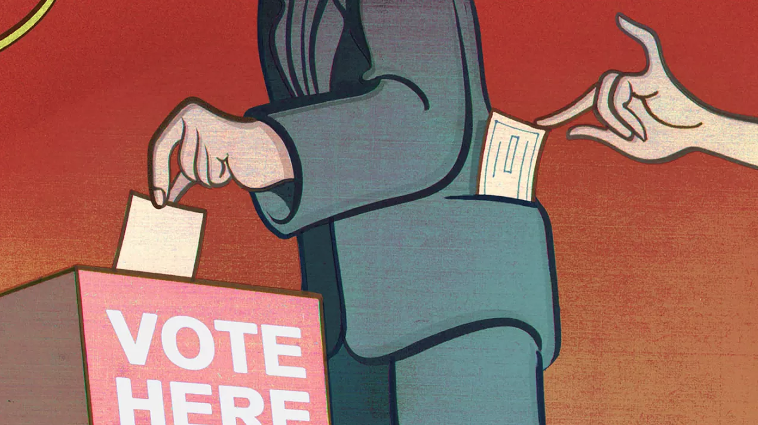CommentsGUEST WORDS--Unlike most other rights, the right to vote does not have obvious or inherent incentives, especially if you believe your vote doesn’t matter or voting is too time-consuming, costly, or a health risk.
That can change with something as simple as paying citizens $100 to register and vote. Done correctly, incentives are capitalism at its best, driving behaviors beneficial to individuals and society. Financial consequences related to citizen responsibilities are already a normal practice. Jurors typically receive $50 per day. If we don’t pay taxes, we get fined. Citizens tend to pay their taxes and show up for jury duty. Is voting any less important?
There is evidence that financial incentives work. Failing to vote in Australia results in a fine of AUS $20-50. Prior to this fine, Australian voter turnout ranged from 47% to 78%. Following implementation, turnout rates have averaged in excess of 90%. Though there are laws in place in the U.S. to prevent individuals, businesses, and organizations from influencing elections by paying voters, the law does not forbid the United States federal government from issuing financial incentives to voters. Some states have already started experimenting with financial incentives for voters and they’ve been largely successful. Academic studies of California voters “found that an incentive of only $25 raised turnout in municipal elections by almost 5%.” When Philadelphia and Los Angeles experimented with voting lotteries, there were “meaningful” increases in turnout.
Increased turnout requires increases in both registration and actual voting. First, the U.S. should give a one-time $100 payout to the approximately 21% of eligible but unregistered voters when they successfully register. Then, only when they vote, each voter should get paid $100. The payment would only be made for congressional and presidential national elections and would be paid out as the voter chooses from a short menu of options. To avoid free speech-related constitutional challenges, no individual would be required to register or vote. Other forms of incentive from individuals, groups, or businesses (for example free or discounted meals or products), ruled illegal in a number of cases, would still be prohibited.
Historically, 50-60% of eligible voters turnout for presidential elections and an even fewer 40% turnout for congressional elections. This gives disproportionate influence to the 10-15% of highly motivated partisans from each of the political right and left. The remaining majority of moderates, and the politically disengaged, are more likely to stay on the sidelines, so it is no wonder that political parties and elected representatives focus solely on their partisan bases. The most politically extreme candidates are likely to argue against incentivized voting, recognizing that increased turnout translates to more moderate voters.
Surprisingly, there are objections to mass turnout. First is the notion that uninformed voters should not vote. Suggesting voters are not informed or intelligent enough to make reasonable choices is the ultimate form of arrogance. It is not about how much voters know about the issues. It is more about asking the right questions of candidates. Every citizen is more than capable of voting for the candidates that best represent their interests.
Second, you often hear “my vote doesn’t matter.” This is a catch-22. With fewer voters, voting matters less. When everyone votes, versus only a partisan minority, proportionate influence is restored. Individual votes matter when all individuals vote. Third, paying citizens to vote will seem wrong to those who rightfully view voting as a patriotic responsibility rather than a compensable job. They may say it “cheapens” our democracy. But at the very least we should provide non-monetary incentives to increase turnout such as automatic registration, a paid holiday on Election Day, or expanded mail-in voting. Finally, some will assert that registration and voting incentives will increase fraud. Fraud is not a meaningful problem. The real issue is ongoing voter suppression caused by State-based restrictions on mail in voting, improper purging of voter lists, and overly restrictive voter ID requirements.
More moderate government is the antidote to partisan politicians who prioritize the needs of rich and powerful donors over the needs of citizens. The November election can send the message to Washington that we need to not only rebuild our economy but also remake our society in the interest of all Americans, not just its partisans. When we fail to stand up for voter participation, we risk election outcomes that rely less on popular vote results and more on the performance of a few swing states. No matter what you think of the electoral college, does any somewhat moderate person really want a President who loses the popular vote by five-to-ten million?
The 2020 election will be the most contentious and expensive in memory. Let’s ensure that citizens determine the outcome rather than money-driven partisan politics. As we spend in excess of $3 trillion to bail out our economy, $100 per citizen is a small price to pay to bail out our democracy.
(Mac Regan is the author of The 2020 American Revolution, 20/20 Decision Support for Voters (available at amazon.com).)
-cw
















